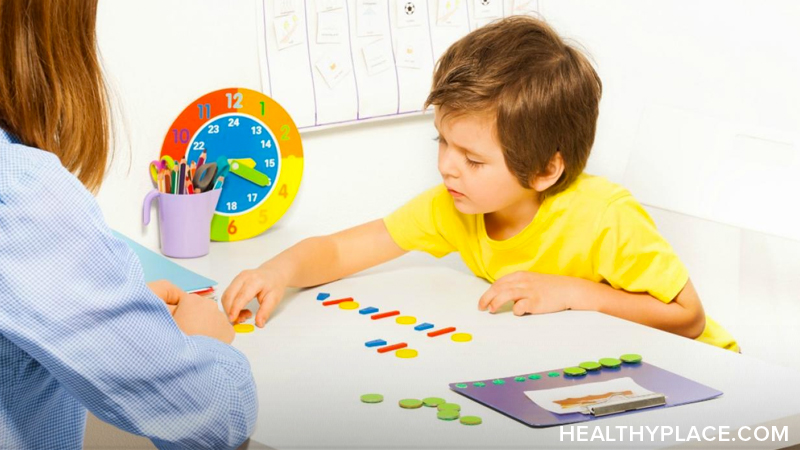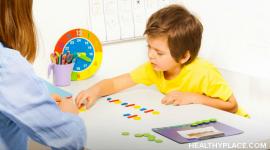Is Autism a Learning Disability? Why or Why Not?

For some children, autism and learning disabilities share overlapping symptoms. Despite this, autism is not a learning disability. Traditionally, the fact that the two disorders—both neurodevelopmental—have similarities has confused even doctors and educators. As we study, research, and observe, our understanding of both autism and learning disabilities increases. Is autism a learning disability? It isn’t. The two conditions are separate disorders. A child can have both, though, or they can have just one. Let’s explore autism and learning disabilities to learn how they affect kids.
Autism Is Not a Learning Disability, but What Is It?
Also called autism spectrum disorder (ASD) because of the wide range of symptoms, severity, and experiences kids can have, this disorder affects how kids process information their brain takes in. The hallmark symptoms and characteristics of autism include:
- Social difficulties
- Communication problems
- Sensory processing troubles
- Repetitive behaviors and movements
- Narrow, obsessive interests in a topic, toy, or other items and ideas
These are the defining features of autism; however, the experience of autism is different for every child. In the communication category, for example, some kids with autism don’t have significant speech deficits, but others experience speech delays and difficulties. Some have average or above-average intelligence, while others have intellectual delays. Overall, kids with autism can be very high functioning or experience severe disability.
Autism is not a learning disability, but it does affect learning. It’s not uncommon for a child with autism to have difficulties with language skills like listening and speaking. This might sound like a learning disorder, but learning disorders have unique symptoms and characteristics of their own.
How Is a Learning Disability Different from Autism?
Learning disorders can interfere in learning skills such as reading and math. A difference is how they impact a child’s life. The academic and developmental effects of autism are much broader than the effects of learning disorders. Autism tends to affect the whole child. Learning disabilities can, too, but typically their impact is narrower, impacting the area of specific disability.
Many different types of learning disorders exist, as opposed to autism’s single disorder on a spectrum of severity and effects. Some types of learning disorders are dyslexia, dysgraphia, and dyscalculia, disrupting abilities in reading, writing, and math, respectively. Other learning disorders are auditory and visual processing disorders, language processing disorder, and nonverbal learning disability. Children have problems learning and completing work in the specific area of their disability.
Nonverbal learning disorder has many characteristics similar to autism. Perhaps the question about autism should be, “Is autism a nonverbal learning disorder?” Kids with nonverbal learning disability experience, among other symptoms:
- Awkwardness
- Difficulty with change and transitions
- Concrete, literal thinking
- Problems with understanding nonverbal communication (such as facial expressions, body language, and tone of voice)
These characteristics fit both nonverbal learning disability and autism. Not only is autism not a learning disorder, nonverbal learning disability isn’t on the autism spectrum.
Other similarities between autism and learning disabilities do cause people to continue to wonder if there is a connection.
Despite Overlap, Autism Is not a Learning Disability
Children with autism and those with a learning disability share some common features. These symptoms are common to both:
- Sensory processing issues (needing to avoid or seek sensory input)
- Trouble with social skills
- Prone to meltdowns
- Communication issues, including difficulty with words
- Difficulty recognizing others’ feelings
- Problems with executive functions (organizing, problem-solving, self-regulating emotions and behaviors, etc.)
- Lack of coordination
Not all symptoms are shared between learning disabilities and autism. Perhaps one of the best reasons why autism is not a learning disability is not the “what”—not a list of similar and different symptoms—but the “how.” For kids with learning disabilities, their symptoms mostly (but not completely) affect their specific area of disability. Children who have autism feel the effects of the disorder more globally and evenly rather than attached to an area of learning.
Autism isn’t a learning disorder. Yet both disorders can significantly affect a child’s life, and kids with either (or both) disorder can be supported and helped. Arm yourself with knowledge about the disorders, and spend time with your child to observe their characteristics.
APA Reference
Peterson, T.
(2022, January 17). Is Autism a Learning Disability? Why or Why Not?, HealthyPlace. Retrieved
on 2026, January 14 from https://www.healthyplace.com/parenting/learning-disabilities/is-autism-a-learning-disability-why-or-why-not



